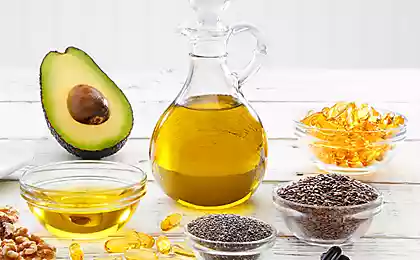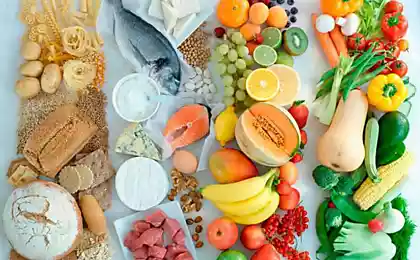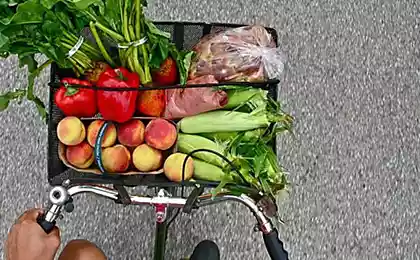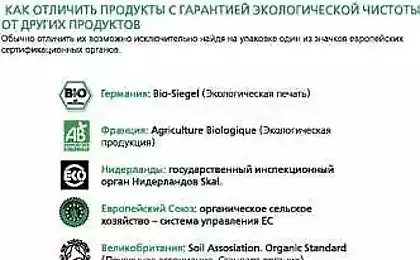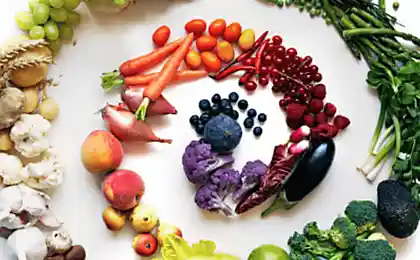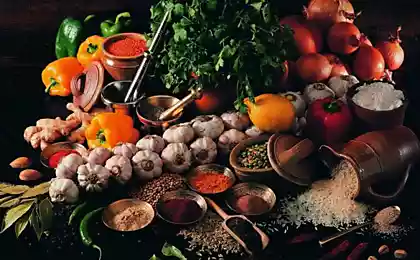845
AGE products: how to recognize and avoid!
The real threat to health are the End Products of Glycosylation deep, CNG, they are the same AGE-products. These compounds can accumulate in our body through two mechanisms: by doing a ready food and be formed directly in the body.
The formation of AGE products in our cells usually is associated with impaired insulin sensitivity and overall carbohydrate metabolism problem. Today we will examine the key rules regarding the education and exposure of CNG from food, know what products to avoid and how to prepare to have formed less than CNG (AGE).
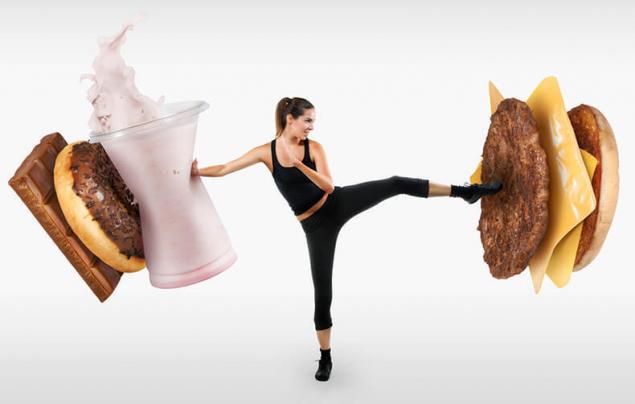
General rule.
1. Learn to recognize CNG food, count how many of them is in your food. Nutrition strategy aimed at reducing the CNG, coming from food, delays aging, prolongs life, and has opposite effects to the above diseases.
2. Limit the number of products with a high content of CNG.
3. Culinary cooking technology, providing a minimum of CNG. CNG visible to the naked eye, is the reaction of the Browning. Boiled condensed milk in baking poboril, milk ghee has acquired a different hue, the ruddy crust on bread, on crackers, changed the color of the beer, liquor, and some chocolates it also CNG, eating you replenish your body with CNG. CNG where the food is cooked at high temperature.
4. Balance of carbohydrate and insulin. The restriction of carbohydrates, good insulin sensitivity, pure time without food, low glycogen stores, muscle development (a buffer for FFA, and glucose) and other things that protect against internal education of CNG, this will be a separate conversation.
5. Destruction accumulated in the body CNG: autophagy. This has to be the article.
How safe is CNG?
These substances should be afraid not only to diabetics but also to healthy people. More precisely, those of them who abuse sweet. The danger formula is simple: lots of sugar + proteins = the process of formation of the KPD went. Second – even if you're not sweet too much respect, KPG can do to your body is another way directly from food.
Even today for a person the exact allowed number of CNG per day is not established. However, in animal studies it was shown that the reduction of the KKE's only 50% a day greatly improved health and prolonged life. So probably it is better to strive for the same period in 7 500 units CNG for humans. Ideally strive in their diet to 7500-9000 units of CNG per day.
Table CNG food
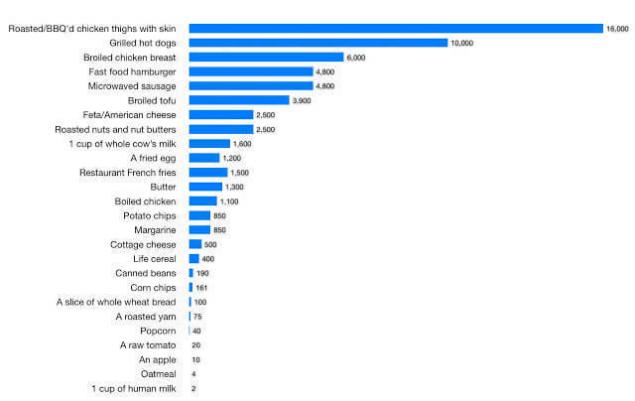
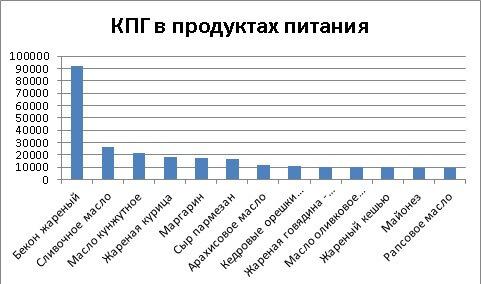
Poison in small doses can cure.
At low temperatures also can produce Browning. But not all Poduct darkening (melanoidins) is clearly harmful. A small amount of glycation end products and those that are formed in these processes can be very useful. In the scientific literature lacks data on the beneficial properties of CNG — antioxidant, antimicrobial, immunomodulatory, as well as their ability to bind heavy metal ions.
For the first time antioxidant activity of the products of the Maillard reaction was discovered in 1961 in experiments with cooked meat. Then it was shown that cooked meat inhibited lipid peroxidation, and the role of inhibitors are actually some products of glycation and maltol formed in beef during cooking. The study melanoidin coffee that have unfolded in recent years, pushing scientists to believe that they can reduce the risk of cancer.
In addition, they enhance the synthesis of enzymes of the family of glutathione-S-transferase which neutralize different xenobiotics. Melanoidins perform the same function as dietary fiber, improve digestion and stimulate the growth of bifidobacteria, that is, detect properties of prebiotics.
Identify and avoid.
There are products in which sugar and proteins has responded, forming "food glycotoxin" (so-called CNG present in the finished food). Recognize them often by the color: the accumulation of glycotoxins changes the hue of the food, as expressed by chemists, calls the "Browning reaction". Appetizing brown baked milk, fermented baked milk and boiled condensed milk, crisp bread, buns, meat, poultry – all this is a sign of high concentration of CNG.
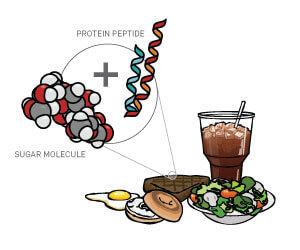
Hazard gives the food a vibrant taste and aroma, so the "brown" of Goodies so desirable and so impossible. If you have ever cooked toast, you know about the process of glycation firsthand.
Toast bread undergoes a reaction leading to darkening of the surface that occur when heating food and cooking under the high temperature. This reaction also usually occurs when we fry meat, fish or making French fries.
Levels of toxic substances in the human body with age increase, including due to the foods we eat. Previously, scientists had underestimated the destructive influence of gliotoxin on human cells, its organs and tissues.
Recent studies, however, showed striking evidence of the important role played by the derived from food glycotoxin in the development of the process of glycation. Also, not so long ago, scientists found that the end products of glycation deep are of great importance in accelerating the process of aging, as well as in the development of diseases such as diabetes, heart disease, kidney, cancer, Alzheimer's and certain types of neuropathy.
The level of glycotoxins increases dramatically in people who have an increased amount of glucose in the blood, because the glucose is the breeding ground for these harmful substances. Thus, gliotoxin are particularly common in humans suffering from metabolic syndrome or diabetes. .
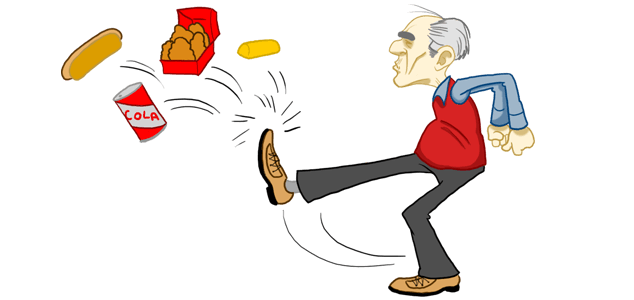
Reducing the consumption of CNG with food improves the condition. A recent study showed that a moderate reduction in the consumption of foods rich derived from glycation substances, improved parameters of insulin resistance in adult persons with diabetes of the 2nd type. Reducing CNG can slow aging, prevent dangerous diseases, slow down the appearance of wrinkles and greatly extend the life. The looks and CNG I will write separately.
Reducing products with a high content of CNG.
1. Reduce the number of semi-finished products. Limit your intake of processed foods. A lot of processed food exposed to high temperatures when cooking food, to extend shelf life, thus they may have high content of final products of enhanced glycosylation.
2. Fried meat and processed meat products. It is believed that 10 percent of the end products of enhanced glycosylation that we get when eating fried hamburgers and fried chicken can be absorbed into our tissues and blood. For several years studied the impact of CNG from food to health.
From this study we can see that the champion on the content of CNG is fried bacon. Bacon-wrapped CNG so that the rest of the food just pales in front of him. Let's define what is the optimal amount of CNG to humans. From research we know that the average diet of Americans contains about 15 000 units of CNG per day. Hence, the figure above this will be considered a threat. Eat just 100 grams of fried bacon, and you получите30 000 units of the KKE.
3. Fast food. Chips, French fries, fried bacon, hamburgers, Cola — an absolute record for the content in CNG, the vast majority of fast food contains a lot of CNG. Besides a lot of them and in the products, the taste of which gives the reaction of caramelization — in fact the heating sugar: Coca-Cola, caramel, beer, and many others.
Diabetes Protocol: aspects of glycation.
This topic requires a long discussion, for now just some points:
1. Sugar. Standard — no more than 5 grams a day including the hidden sugar in prepared foods. Clearly limit the sweets and flour — foods with a high glycemic index. The most dangerous combination is sugar+protein+fat.
2. Limit fructose. Especially dangerous is fructose by itself or as part of sugar. In the reaction of formation of KPG fructose which is 200 times more active than glucose.
3. Do not eat large amounts of refined foods with a high glycemic index. Usually this does not apply to fruits or vegetables because they contained pectin plays a role carbohydrate buffer, smoothing out fluctuations
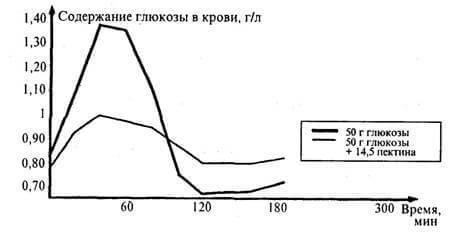
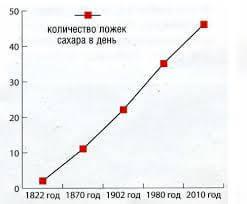
4. Meals 2-3 times a day. The smaller spikes of glucose, the better.
5. Good insulin sensitivity. Postprandial glycemia is a measure of how all will be bad with glycation of tissues.
6. Carbohydrates eat more in the day, as insulin sensitivity decreases.
7. Do not use sugar in cooking, where it will heat up. It is extremely dangerous.
8. Differentiate between free sugars and related. Thus, fructose in the stake and in the pear have different profiles of learning.
9. Honey, maple syrup is same as sugar. Here are the names of sugar:
names for sugar: high fructose corn syrup, "high fructose corn syrup", GFS, HFCS, GFS, sucrose, maltose, corn syrup, molasses, cane sugar, corn sugar, raw sugar, honey, fruit concentrate, honey, maple syrup, powdered malt, corn and its derivatives, rice and corn syrup, treacle, molasses, raw, dried cane syrup, invert sugar, brown rice syrup, white grape juice or other fruit concentrates
10. Eat Breakfast! Many eat for Breakfast, it reduces postprandial glycemia during the day. Considering the standard three meals a day diet, note that most of the time during the day falls on the as after a meal (postabsorptive state). Therefore, an excessive increase in the level of glucose in the blood after a meal, on the one hand, is an early and the most appropriate diagnostic sign of diabetes of the second type, on the other — has an adverse prognostic value, in terms of cardiovascular complications. Read more (link).
Technology healthy cooking
1. Higher temperature – more CNG, much more!
The higher the temperature of cooking, the more formed the KPD. The products of glycation are typically found in meats grilled at high temperatures.
Particularly intense CNG are formed during heat processing of foods at temperatures above 120 degrees Celsius frying (fried potato and meat), baking (pies out of the oven and apples), roasting by fire (barbecue). Golden crust formed during frying and baking — this is the KKE. Here, the temperature of the different methods of cooking: boiling (100°C), broiling (225°C), frying in oil (180°C), frying in the oven (230°C) and roasting (177°C).
The results showed that the higher was the temperature at which there is preparation of food, the higher it was the level of glycation end products. For example, in 100 g of raw beef contains 707 kU 1 serving advanced glycation end products, and 100 grams of roast beef — 6071 kU for 1 serving.
In the analysis of a typical national diets, it was established that meat eating is associated with arrival of the greatest number of glycation end products in the human body, followed by vegetable oils, cheese and fish. Such foods as Krupaderov, eggs, fruits and vegetables, legumes, milk, nuts, usually associated with a slight intake of advanced glycation end products in the body, perhaps because prepared at low temperatures or make up a small part of the diet.
Education of KPG for different cooking modes.
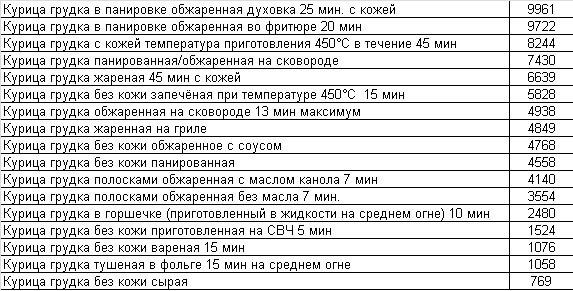
EGG OMELETTE COOKED IN BUTTER
507
EGG OMELETTE COOKED WITH OLIVE OIL
337
EGG FRIED IN BUTTER
337
EGG FRIED IN OLIVE OIL
243
EGG FRIED IN CORN OIL
173
EGG OMELET WITH CORN OIL
123
BOILED EGGS
63
2. Reduce temperature! Use healthy methods of cooking!
Reduce temperature of cooking meat and proteins. Cook for a couple fish and seafood, simmer chicken in sauce and cook red meat.
If you are cooking meat in liquid at a low temperature, as in a slow cooker, you will reduce the amount of cell-damaging compounds known as advanced glycation that is reduced by 50 percent when using slow cooking, compared with broiling or grilling. That's why slow cooking is probably one of the safest ways of cooking meat.
Actively use other methods of cooking such as braising, marinating or steaming instead of frying meat on the grill. You can prepare a special apparatus that puts out products in water at low temperature (between 75 and 95 Gy). The cooking process lasts for six hours in this case. Can be steamed or simply boiled. Here is a list of possibilities (and it is still incomplete):
blanching — briefly scalding or extremely short (1 minute) boiling product. Used for Bystrovka products for easier purification of the product from the skin, preserving, and finally to destroy harmful bacteria. The product is poured with boiling water or steam in a sealed container or immersed in boiling water (0,5 – 5 min).
cooking (cooking) is one of the most common types of heat treatment. Is that the processed is fully immersed in hot (boiling) water (or other liquid) product.
quenching — the middle procedure between roasting and jam. In contrast to these methods, a heat treatment is always performed under the hood. Usually carried out from 40 minutes in a closed pot over a slow fire. Usually stewed meats and fish along with various vegetables and spices, the more diverse the composition, the richer the taste and aroma of the finished dish.
polerowanie — slow cooking foods in water without boiling, at temperatures up to a maximum of 95 degrees, gentle method of thermal processing products, which helps to maintain the structure and the vitamins used in the products. It is used for preparation of vegetables, fruits, fish, eggs and meat. Rullman indicates water temperature between 71°C and 82°C, below the temperature of bubble point (88°C).
cooking in vacuume (also sous vide, from the French. sous-vide "under vacuum") is a cooking method in which meat or vegetables are placed in a plastic bag pumped with air and slowly prepared at a relatively low and precisely controlled temperature, usually in a water bath. Cooking in vacuum is usually performed at a temperature of about 55-60 °C for vegetables are used and higher temperatures.
yearning — in cooking — method of cooking using a slow, long stewing at a constant low temperature in a tightly sealed container (usually below the boiling point of water). Real slow-cooked flavor is obtained only when cooking in the Russian oven at gradually decreasing temperature. Modern technologies use Tabarka or braising in the oven with periodic podlivaniem fluid to maintain the velocity of evaporation.
propuskanii — cooking foods in a small amount of liquid or in its own juice. This method is used mainly when cooking food with high moisture content. The product is filled with liquid to 1/3 its volume and heated with the lid closed. In this case, the lower part of the product boiled in the water, and the top — of steam.
3. Contact with the air.
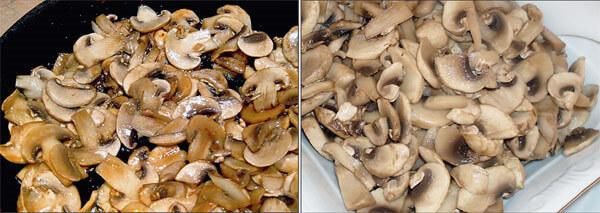
Mushrooms, fried in olive oil left in an open pan, to the right, while stirring under the hood.
Upon contact with the air to produce more CNG. Cook with the lid closed.
4. Open flame and direct heat. Dry heat.
Frying, grilling, etc. lean meat, such as chicken, contain high levels of food end-products of enhanced glycosylation when they are cooked using dry heat. Limit the amount of grilled, roasted on an open fire, fried and microwaved meats in your diet.
When cooking with dry heat is produced– methylglyoxal (MG) is a late type of the end product of glycation, which, as it turned out, lowers the protective ability of the body to control inflammation. In mice that consumed the MG started to develop early insulin resistance and increased fat in the body, in contrast to the healthy control group.
5. Frying with fat.
Chicken breast, deep-fried for 20 minutes contains 9 times more end-products of glycation than the same breast, subjected to boiling for one hour. A link between prostate cancer and foods cooked in oil, is limited at the highest level of consumption — defined in our study as more than once a week — which suggests that regularly eating deep-fried food leads to exceptional risk of developing prostate cancer". Already there is evidence that consumption of such food leads to different types of cancer, such as breast, lung, pancreatic cancer, cancer of the head and neck and cancer of the esophagus.
6. Add more water.
The presence of water slows the reaction of glycation, also sit, the water does not allow the temperature to rise above 100 C.
7. Limit red meat.
The end products of enhanced glycosylation are found in beef, pork here the highest levels. Compared to other meats, lamb has the lowest levels of the food end-products of enhanced glycosylation. Cook red meat in the most sparing ways.
8. Include in your diet more fruits and vegetables.
Cooked or raw, they naturally have a low content of end products of enhanced glycosylation, and many of them contain complex compounds such as antioxidants which can reduce damage to the end products of enhanced glycosylation.
9. The balance of raw-cooked.
Vegetables use part raw and part of the process. Important healthy balance of raw and cooked. Temperature in the range from 41°F to 135°F (5°C to 57°C) is considered the "danger zone" because it is usually the bacteria multiply and, thus, do not store food at that temperature.
Scientists note that vitamin C when cooking fruit and vegetables remains in the water and is destroyed in the oxidation process. When cleaning vegetables, the vitamin C content significantly reduced, especially when cleaning the potatoes, where the greatest part of this vitamin in the skin. However, the study has shown that, in some cases, cooked vegetables in the body receives more carotenoids than raw. So a balance is important, but not extreme.
7. Excessive heat treatment of vegetables degrades their quality.
The best option is al'dente. Al dente is a concept in cooking, indicating the degree of availability of products (usually pasta), when, being fully prepared, they retain tangible by the bite of an internal elasticity.
The term "al dente" comes from Italian and means "to the tooth" or "to the bite", emphasizing the feeling of the elastic snap (or crunch for vegetables), while raskusyvanii. In the villages people use the phrase "crunching" (accent on the last syllable).
That is basically the vegetables should be crisp on the teeth. After 2, 3 minutes since boot vegetables, try them on taste. The main thing is not to overdo the vegetables. If the taste of the vegetables have enough elastic structure, and not break up with a fork, but they taste like it raw crunchy vegetable, it is a sign that the vegetables time to take out.
In a pre-prepared cold water and throw the ice cubes, take a large spoon with holes and put the vegetables in cold water. Then wait a few minutes until the vegetables are cooled, remove them and serve with the main course. Be careful that the vegetables when serving was not cold.
For that, drop the vegetables into ice water? The cold water instantly cools the vegetables without giving them their own temperature to soften, thanks to the vegetables must remain the same as at the time of their last sample. Vegetables al'dente, not everyone can the first time not properly digested to prepare.
Only a skilled cook thanks to the help of life experience will be able to cook vegetables al'dente correctly. We need to train. Also al dente cooked vegetables, less rice, beans and even meat, but the applicability to them of this term is disputed. Vegetables al dente when it is ready, it is necessary to cool (for example, dipped in water with ice).
8. Use the power of acidic environment.
You need to pre-marinate any meat. Marinade reduces the amount of 2 times. But if you add spices-antioxidants, then the situation will be even better.
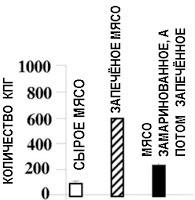
Cooking may occur by chemical reactions, without heat, as in the case of the traditional dishes of Ceviche in South America, for which fish is prepared by pickling it in acid juices of lemon or lime. Sushi is prepared on the basis of such a chemical reaction that occurs between the fish and rice is marinated in vinegar.
Can be used for acidification: Apple, wine vinegar, balsamic vinegar, lemon juice, lemon pulp, lime, yeast, etc. as well As marinades (without sugar!)
9. Qualitative composition of the products: lysine and fructose.
Of all the amino acids the greatest color in the Maillard reaction yields due to the presence of lysine ε-amino group. Cysteine gives the weakest color. Therefore, foods that contain proteins rich in lysine, such as milk, quickly darken. Also the color is affected by the ratio of sugars and amines.For example, in the experimental sample with the compound form of the glucose-glycine containing 65% of water at 65 degrees Celsius storage temperature there is a rapid color change decreasing relationship of glucose to glycine.
Attempts to prevent reactions in the products should be directed to one of the reactive substances as amino compounds from foods rich in carbohydrates, or sugars from foods with high protein content. During the Maillard reaction also produces water. Thus, due to the law of mass action, the reaction is slowed down in products containing water.
Various sugars have different reactivity. For example, fructose is 100-200 times more active than glucose. Keep in mind that the Maillard reaction reduces the biological value of the proteins, since amino acids, especially lysine, threonine, arginine and methionine, which are often lacking in the body after connecting with the sugars unavailable to digestive enzymes and therefore not absorbed.
See also:
These exercises Zhou Lucina will return GRAY hair to original color
TAPPING FOR THE TREATMENT OF INSOMNIA
10. Heat sugar or foods with a high glycemic index along with proteins!
Caramelization, watering sauces or marinades with sugar for the crust, breading crumbs, etc — all of these methods can greatly increase the number of CNG! published
Author: Andrey Blueskin
P. S. And remember, only by changing their consumption — together we change the world! ©
Join us in Facebook , Vkontakte, Odnoklassniki
Source: www.beloveshkin.com/2016/05/glikaciya-eda.html
The formation of AGE products in our cells usually is associated with impaired insulin sensitivity and overall carbohydrate metabolism problem. Today we will examine the key rules regarding the education and exposure of CNG from food, know what products to avoid and how to prepare to have formed less than CNG (AGE).

General rule.
1. Learn to recognize CNG food, count how many of them is in your food. Nutrition strategy aimed at reducing the CNG, coming from food, delays aging, prolongs life, and has opposite effects to the above diseases.
2. Limit the number of products with a high content of CNG.
3. Culinary cooking technology, providing a minimum of CNG. CNG visible to the naked eye, is the reaction of the Browning. Boiled condensed milk in baking poboril, milk ghee has acquired a different hue, the ruddy crust on bread, on crackers, changed the color of the beer, liquor, and some chocolates it also CNG, eating you replenish your body with CNG. CNG where the food is cooked at high temperature.
4. Balance of carbohydrate and insulin. The restriction of carbohydrates, good insulin sensitivity, pure time without food, low glycogen stores, muscle development (a buffer for FFA, and glucose) and other things that protect against internal education of CNG, this will be a separate conversation.
5. Destruction accumulated in the body CNG: autophagy. This has to be the article.
How safe is CNG?
These substances should be afraid not only to diabetics but also to healthy people. More precisely, those of them who abuse sweet. The danger formula is simple: lots of sugar + proteins = the process of formation of the KPD went. Second – even if you're not sweet too much respect, KPG can do to your body is another way directly from food.
Even today for a person the exact allowed number of CNG per day is not established. However, in animal studies it was shown that the reduction of the KKE's only 50% a day greatly improved health and prolonged life. So probably it is better to strive for the same period in 7 500 units CNG for humans. Ideally strive in their diet to 7500-9000 units of CNG per day.
Table CNG food


Poison in small doses can cure.
At low temperatures also can produce Browning. But not all Poduct darkening (melanoidins) is clearly harmful. A small amount of glycation end products and those that are formed in these processes can be very useful. In the scientific literature lacks data on the beneficial properties of CNG — antioxidant, antimicrobial, immunomodulatory, as well as their ability to bind heavy metal ions.
For the first time antioxidant activity of the products of the Maillard reaction was discovered in 1961 in experiments with cooked meat. Then it was shown that cooked meat inhibited lipid peroxidation, and the role of inhibitors are actually some products of glycation and maltol formed in beef during cooking. The study melanoidin coffee that have unfolded in recent years, pushing scientists to believe that they can reduce the risk of cancer.
In addition, they enhance the synthesis of enzymes of the family of glutathione-S-transferase which neutralize different xenobiotics. Melanoidins perform the same function as dietary fiber, improve digestion and stimulate the growth of bifidobacteria, that is, detect properties of prebiotics.
Identify and avoid.
There are products in which sugar and proteins has responded, forming "food glycotoxin" (so-called CNG present in the finished food). Recognize them often by the color: the accumulation of glycotoxins changes the hue of the food, as expressed by chemists, calls the "Browning reaction". Appetizing brown baked milk, fermented baked milk and boiled condensed milk, crisp bread, buns, meat, poultry – all this is a sign of high concentration of CNG.

Hazard gives the food a vibrant taste and aroma, so the "brown" of Goodies so desirable and so impossible. If you have ever cooked toast, you know about the process of glycation firsthand.
Toast bread undergoes a reaction leading to darkening of the surface that occur when heating food and cooking under the high temperature. This reaction also usually occurs when we fry meat, fish or making French fries.
Levels of toxic substances in the human body with age increase, including due to the foods we eat. Previously, scientists had underestimated the destructive influence of gliotoxin on human cells, its organs and tissues.
Recent studies, however, showed striking evidence of the important role played by the derived from food glycotoxin in the development of the process of glycation. Also, not so long ago, scientists found that the end products of glycation deep are of great importance in accelerating the process of aging, as well as in the development of diseases such as diabetes, heart disease, kidney, cancer, Alzheimer's and certain types of neuropathy.
The level of glycotoxins increases dramatically in people who have an increased amount of glucose in the blood, because the glucose is the breeding ground for these harmful substances. Thus, gliotoxin are particularly common in humans suffering from metabolic syndrome or diabetes. .

Reducing the consumption of CNG with food improves the condition. A recent study showed that a moderate reduction in the consumption of foods rich derived from glycation substances, improved parameters of insulin resistance in adult persons with diabetes of the 2nd type. Reducing CNG can slow aging, prevent dangerous diseases, slow down the appearance of wrinkles and greatly extend the life. The looks and CNG I will write separately.
Reducing products with a high content of CNG.
1. Reduce the number of semi-finished products. Limit your intake of processed foods. A lot of processed food exposed to high temperatures when cooking food, to extend shelf life, thus they may have high content of final products of enhanced glycosylation.
2. Fried meat and processed meat products. It is believed that 10 percent of the end products of enhanced glycosylation that we get when eating fried hamburgers and fried chicken can be absorbed into our tissues and blood. For several years studied the impact of CNG from food to health.
From this study we can see that the champion on the content of CNG is fried bacon. Bacon-wrapped CNG so that the rest of the food just pales in front of him. Let's define what is the optimal amount of CNG to humans. From research we know that the average diet of Americans contains about 15 000 units of CNG per day. Hence, the figure above this will be considered a threat. Eat just 100 grams of fried bacon, and you получите30 000 units of the KKE.
3. Fast food. Chips, French fries, fried bacon, hamburgers, Cola — an absolute record for the content in CNG, the vast majority of fast food contains a lot of CNG. Besides a lot of them and in the products, the taste of which gives the reaction of caramelization — in fact the heating sugar: Coca-Cola, caramel, beer, and many others.
Diabetes Protocol: aspects of glycation.
This topic requires a long discussion, for now just some points:
1. Sugar. Standard — no more than 5 grams a day including the hidden sugar in prepared foods. Clearly limit the sweets and flour — foods with a high glycemic index. The most dangerous combination is sugar+protein+fat.
2. Limit fructose. Especially dangerous is fructose by itself or as part of sugar. In the reaction of formation of KPG fructose which is 200 times more active than glucose.
3. Do not eat large amounts of refined foods with a high glycemic index. Usually this does not apply to fruits or vegetables because they contained pectin plays a role carbohydrate buffer, smoothing out fluctuations


4. Meals 2-3 times a day. The smaller spikes of glucose, the better.
5. Good insulin sensitivity. Postprandial glycemia is a measure of how all will be bad with glycation of tissues.
6. Carbohydrates eat more in the day, as insulin sensitivity decreases.
7. Do not use sugar in cooking, where it will heat up. It is extremely dangerous.
8. Differentiate between free sugars and related. Thus, fructose in the stake and in the pear have different profiles of learning.
9. Honey, maple syrup is same as sugar. Here are the names of sugar:
names for sugar: high fructose corn syrup, "high fructose corn syrup", GFS, HFCS, GFS, sucrose, maltose, corn syrup, molasses, cane sugar, corn sugar, raw sugar, honey, fruit concentrate, honey, maple syrup, powdered malt, corn and its derivatives, rice and corn syrup, treacle, molasses, raw, dried cane syrup, invert sugar, brown rice syrup, white grape juice or other fruit concentrates
10. Eat Breakfast! Many eat for Breakfast, it reduces postprandial glycemia during the day. Considering the standard three meals a day diet, note that most of the time during the day falls on the as after a meal (postabsorptive state). Therefore, an excessive increase in the level of glucose in the blood after a meal, on the one hand, is an early and the most appropriate diagnostic sign of diabetes of the second type, on the other — has an adverse prognostic value, in terms of cardiovascular complications. Read more (link).
Technology healthy cooking
1. Higher temperature – more CNG, much more!
The higher the temperature of cooking, the more formed the KPD. The products of glycation are typically found in meats grilled at high temperatures.
Particularly intense CNG are formed during heat processing of foods at temperatures above 120 degrees Celsius frying (fried potato and meat), baking (pies out of the oven and apples), roasting by fire (barbecue). Golden crust formed during frying and baking — this is the KKE. Here, the temperature of the different methods of cooking: boiling (100°C), broiling (225°C), frying in oil (180°C), frying in the oven (230°C) and roasting (177°C).
The results showed that the higher was the temperature at which there is preparation of food, the higher it was the level of glycation end products. For example, in 100 g of raw beef contains 707 kU 1 serving advanced glycation end products, and 100 grams of roast beef — 6071 kU for 1 serving.
In the analysis of a typical national diets, it was established that meat eating is associated with arrival of the greatest number of glycation end products in the human body, followed by vegetable oils, cheese and fish. Such foods as Krupaderov, eggs, fruits and vegetables, legumes, milk, nuts, usually associated with a slight intake of advanced glycation end products in the body, perhaps because prepared at low temperatures or make up a small part of the diet.
Education of KPG for different cooking modes.

EGG OMELETTE COOKED IN BUTTER
507
EGG OMELETTE COOKED WITH OLIVE OIL
337
EGG FRIED IN BUTTER
337
EGG FRIED IN OLIVE OIL
243
EGG FRIED IN CORN OIL
173
EGG OMELET WITH CORN OIL
123
BOILED EGGS
63
2. Reduce temperature! Use healthy methods of cooking!
Reduce temperature of cooking meat and proteins. Cook for a couple fish and seafood, simmer chicken in sauce and cook red meat.
If you are cooking meat in liquid at a low temperature, as in a slow cooker, you will reduce the amount of cell-damaging compounds known as advanced glycation that is reduced by 50 percent when using slow cooking, compared with broiling or grilling. That's why slow cooking is probably one of the safest ways of cooking meat.
Actively use other methods of cooking such as braising, marinating or steaming instead of frying meat on the grill. You can prepare a special apparatus that puts out products in water at low temperature (between 75 and 95 Gy). The cooking process lasts for six hours in this case. Can be steamed or simply boiled. Here is a list of possibilities (and it is still incomplete):
blanching — briefly scalding or extremely short (1 minute) boiling product. Used for Bystrovka products for easier purification of the product from the skin, preserving, and finally to destroy harmful bacteria. The product is poured with boiling water or steam in a sealed container or immersed in boiling water (0,5 – 5 min).
cooking (cooking) is one of the most common types of heat treatment. Is that the processed is fully immersed in hot (boiling) water (or other liquid) product.
quenching — the middle procedure between roasting and jam. In contrast to these methods, a heat treatment is always performed under the hood. Usually carried out from 40 minutes in a closed pot over a slow fire. Usually stewed meats and fish along with various vegetables and spices, the more diverse the composition, the richer the taste and aroma of the finished dish.
polerowanie — slow cooking foods in water without boiling, at temperatures up to a maximum of 95 degrees, gentle method of thermal processing products, which helps to maintain the structure and the vitamins used in the products. It is used for preparation of vegetables, fruits, fish, eggs and meat. Rullman indicates water temperature between 71°C and 82°C, below the temperature of bubble point (88°C).
cooking in vacuume (also sous vide, from the French. sous-vide "under vacuum") is a cooking method in which meat or vegetables are placed in a plastic bag pumped with air and slowly prepared at a relatively low and precisely controlled temperature, usually in a water bath. Cooking in vacuum is usually performed at a temperature of about 55-60 °C for vegetables are used and higher temperatures.
yearning — in cooking — method of cooking using a slow, long stewing at a constant low temperature in a tightly sealed container (usually below the boiling point of water). Real slow-cooked flavor is obtained only when cooking in the Russian oven at gradually decreasing temperature. Modern technologies use Tabarka or braising in the oven with periodic podlivaniem fluid to maintain the velocity of evaporation.
propuskanii — cooking foods in a small amount of liquid or in its own juice. This method is used mainly when cooking food with high moisture content. The product is filled with liquid to 1/3 its volume and heated with the lid closed. In this case, the lower part of the product boiled in the water, and the top — of steam.
3. Contact with the air.

Mushrooms, fried in olive oil left in an open pan, to the right, while stirring under the hood.
Upon contact with the air to produce more CNG. Cook with the lid closed.
4. Open flame and direct heat. Dry heat.
Frying, grilling, etc. lean meat, such as chicken, contain high levels of food end-products of enhanced glycosylation when they are cooked using dry heat. Limit the amount of grilled, roasted on an open fire, fried and microwaved meats in your diet.
When cooking with dry heat is produced– methylglyoxal (MG) is a late type of the end product of glycation, which, as it turned out, lowers the protective ability of the body to control inflammation. In mice that consumed the MG started to develop early insulin resistance and increased fat in the body, in contrast to the healthy control group.
5. Frying with fat.
Chicken breast, deep-fried for 20 minutes contains 9 times more end-products of glycation than the same breast, subjected to boiling for one hour. A link between prostate cancer and foods cooked in oil, is limited at the highest level of consumption — defined in our study as more than once a week — which suggests that regularly eating deep-fried food leads to exceptional risk of developing prostate cancer". Already there is evidence that consumption of such food leads to different types of cancer, such as breast, lung, pancreatic cancer, cancer of the head and neck and cancer of the esophagus.
6. Add more water.
The presence of water slows the reaction of glycation, also sit, the water does not allow the temperature to rise above 100 C.
7. Limit red meat.
The end products of enhanced glycosylation are found in beef, pork here the highest levels. Compared to other meats, lamb has the lowest levels of the food end-products of enhanced glycosylation. Cook red meat in the most sparing ways.
8. Include in your diet more fruits and vegetables.
Cooked or raw, they naturally have a low content of end products of enhanced glycosylation, and many of them contain complex compounds such as antioxidants which can reduce damage to the end products of enhanced glycosylation.
9. The balance of raw-cooked.
Vegetables use part raw and part of the process. Important healthy balance of raw and cooked. Temperature in the range from 41°F to 135°F (5°C to 57°C) is considered the "danger zone" because it is usually the bacteria multiply and, thus, do not store food at that temperature.
Scientists note that vitamin C when cooking fruit and vegetables remains in the water and is destroyed in the oxidation process. When cleaning vegetables, the vitamin C content significantly reduced, especially when cleaning the potatoes, where the greatest part of this vitamin in the skin. However, the study has shown that, in some cases, cooked vegetables in the body receives more carotenoids than raw. So a balance is important, but not extreme.
7. Excessive heat treatment of vegetables degrades their quality.
The best option is al'dente. Al dente is a concept in cooking, indicating the degree of availability of products (usually pasta), when, being fully prepared, they retain tangible by the bite of an internal elasticity.
The term "al dente" comes from Italian and means "to the tooth" or "to the bite", emphasizing the feeling of the elastic snap (or crunch for vegetables), while raskusyvanii. In the villages people use the phrase "crunching" (accent on the last syllable).
That is basically the vegetables should be crisp on the teeth. After 2, 3 minutes since boot vegetables, try them on taste. The main thing is not to overdo the vegetables. If the taste of the vegetables have enough elastic structure, and not break up with a fork, but they taste like it raw crunchy vegetable, it is a sign that the vegetables time to take out.
In a pre-prepared cold water and throw the ice cubes, take a large spoon with holes and put the vegetables in cold water. Then wait a few minutes until the vegetables are cooled, remove them and serve with the main course. Be careful that the vegetables when serving was not cold.
For that, drop the vegetables into ice water? The cold water instantly cools the vegetables without giving them their own temperature to soften, thanks to the vegetables must remain the same as at the time of their last sample. Vegetables al'dente, not everyone can the first time not properly digested to prepare.
Only a skilled cook thanks to the help of life experience will be able to cook vegetables al'dente correctly. We need to train. Also al dente cooked vegetables, less rice, beans and even meat, but the applicability to them of this term is disputed. Vegetables al dente when it is ready, it is necessary to cool (for example, dipped in water with ice).
8. Use the power of acidic environment.
You need to pre-marinate any meat. Marinade reduces the amount of 2 times. But if you add spices-antioxidants, then the situation will be even better.

Cooking may occur by chemical reactions, without heat, as in the case of the traditional dishes of Ceviche in South America, for which fish is prepared by pickling it in acid juices of lemon or lime. Sushi is prepared on the basis of such a chemical reaction that occurs between the fish and rice is marinated in vinegar.
Can be used for acidification: Apple, wine vinegar, balsamic vinegar, lemon juice, lemon pulp, lime, yeast, etc. as well As marinades (without sugar!)
9. Qualitative composition of the products: lysine and fructose.
Of all the amino acids the greatest color in the Maillard reaction yields due to the presence of lysine ε-amino group. Cysteine gives the weakest color. Therefore, foods that contain proteins rich in lysine, such as milk, quickly darken. Also the color is affected by the ratio of sugars and amines.For example, in the experimental sample with the compound form of the glucose-glycine containing 65% of water at 65 degrees Celsius storage temperature there is a rapid color change decreasing relationship of glucose to glycine.
Attempts to prevent reactions in the products should be directed to one of the reactive substances as amino compounds from foods rich in carbohydrates, or sugars from foods with high protein content. During the Maillard reaction also produces water. Thus, due to the law of mass action, the reaction is slowed down in products containing water.
Various sugars have different reactivity. For example, fructose is 100-200 times more active than glucose. Keep in mind that the Maillard reaction reduces the biological value of the proteins, since amino acids, especially lysine, threonine, arginine and methionine, which are often lacking in the body after connecting with the sugars unavailable to digestive enzymes and therefore not absorbed.
See also:
These exercises Zhou Lucina will return GRAY hair to original color
TAPPING FOR THE TREATMENT OF INSOMNIA
10. Heat sugar or foods with a high glycemic index along with proteins!
Caramelization, watering sauces or marinades with sugar for the crust, breading crumbs, etc — all of these methods can greatly increase the number of CNG! published
Author: Andrey Blueskin
P. S. And remember, only by changing their consumption — together we change the world! ©
Join us in Facebook , Vkontakte, Odnoklassniki
Source: www.beloveshkin.com/2016/05/glikaciya-eda.html
This drink improves the functioning of liver and kidneys
Incredibly aesthetic rural life — photo essay












